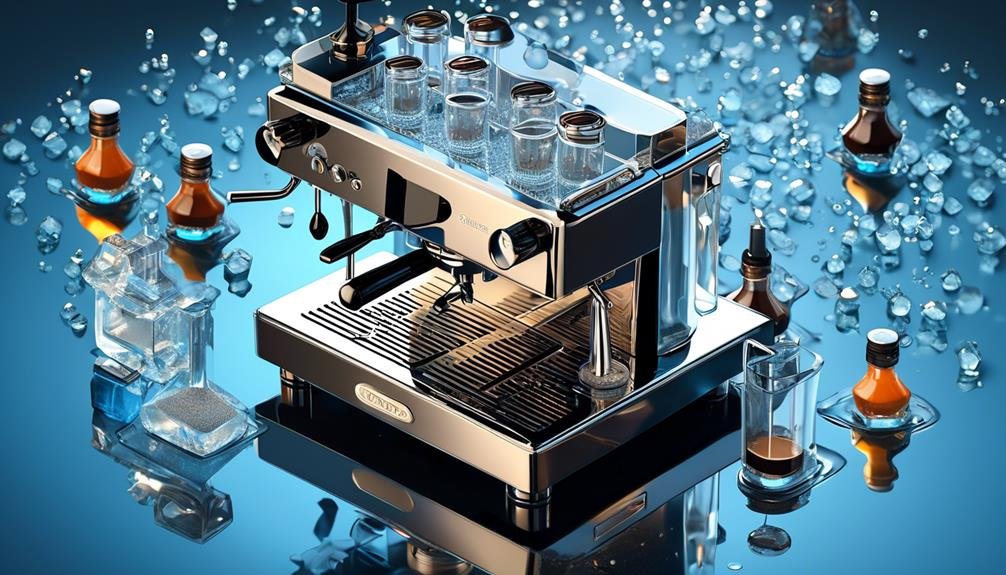Are you tired of inconsistent espresso shots? Do you want to unlock the true potential of your espresso machine? Well, look no further than the water you use.
Yes, that's right, the mineral composition of your water can greatly impact the taste and quality of your espresso. But what exactly is the best water mineral composition for espresso machines?
In this discussion, we will explore the importance of water minerals, the impact they have on your espresso, and how to find the perfect balance to achieve that perfect brew.
So, grab a cup of your favorite coffee and get ready to discover the secrets to a truly exceptional espresso experience.
Key Takeaways
- Water minerals, specifically calcium and magnesium, play a crucial role in the taste and quality of espresso.
- The ideal water hardness for espresso is moderate, with a range of 50-150 ppm or 3-7 gpg.
- Hard water can cause scale buildup, while soft water can result in weak espresso.
- Finding the right balance of minerals, such as calcium and magnesium, is essential for a well-rounded flavor profile in espresso.
Importance of Water Minerals
The mineral composition of water plays a crucial role in the performance and quality of espresso machines. Understanding the importance of water minerals is essential for achieving the best results in making espresso. The presence of certain minerals affects the taste, extraction, and overall lifespan of the machine.
Calcium and magnesium are the two most significant minerals that impact espresso quality. These minerals contribute to water hardness, which is typically measured in parts per million (ppm) or grains per gallon (gpg). Water with a moderate level of hardness, around 50 to 150 ppm or 3 to 7 gpg, is generally considered ideal for espresso extraction.
Hard water can cause scale buildup in espresso machines, affecting their performance and longevity. On the other hand, soft water lacks the necessary minerals to properly extract flavor from the coffee grounds, resulting in a weak and underwhelming espresso.
To ensure the proper mineral composition, it's recommended to use filtered or purified water. This helps in achieving a balanced hardness level and prevents the buildup of scale. Additionally, using water with the right mineral content helps preserve the integrity of the machine's internal components, enhancing its overall lifespan.
Understanding Water Hardness
Understanding water hardness is crucial when it comes to maintaining the optimal functioning of your espresso machine. Water hardness is primarily determined by the amount of dissolved minerals, such as calcium and magnesium, present in the water. These minerals can have a significant impact on the taste, texture, and overall quality of your espresso.
Water hardness is typically measured in parts per million (ppm) or grains per gallon (gpg). The higher the ppm or gpg value, the harder the water. Hard water contains a higher concentration of minerals, while soft water has a lower mineral content. It's important to note that water hardness can vary depending on the region and source of the water.
The presence of minerals in water can cause scaling inside the espresso machine's heating elements and pipes. This scale buildup can lead to decreased water flow, reduced heat transfer efficiency, and ultimately, a decline in the machine's performance. In addition, the minerals can also affect the taste of the espresso, resulting in a less desirable flavor profile.
To ensure optimal espresso machine performance and quality, it's essential to understand the water hardness in your area and take appropriate measures to manage it. This can include using water softeners or filtration systems to reduce the mineral content, or regularly descaling the machine to remove any scale buildup. By maintaining the right water hardness, you can enjoy consistently great-tasting espresso and prolong the lifespan of your machine.
Impact of Minerals on Espresso Taste
Minerals in the water significantly impact the taste of your espresso. The presence and concentration of different minerals can alter the flavor profile, acidity, and overall quality of your brew. To better understand the impact of minerals on espresso taste, let's take a closer look at the table below:
| Mineral | Impact on Espresso Taste |
|---|---|
| Calcium | Enhances body and richness of espresso |
| Magnesium | Adds sweetness and improves extraction |
| Sodium | Can result in a bitter and harsh taste |
| Potassium | Enhances acidity and brightness |
| Chloride | Enhances sweetness and balances acidity |
As you can see from the table, each mineral has a distinct effect on the taste of your espresso. Calcium, for example, enhances the body and richness of the brew, while magnesium adds sweetness and improves extraction. On the other hand, sodium can lead to a bitter and harsh taste, so it's important to ensure the right balance. Potassium enhances acidity and brightness, while chloride enhances sweetness and balances acidity.
Finding the Right Balance of Minerals
To achieve the optimal flavor in your espresso, it's essential to carefully balance the mineral composition of your water. Finding the right balance of minerals is crucial in order to extract the full potential of your coffee beans and create a rich, flavorful shot of espresso.
Here are three key factors to consider when determining the mineral composition of your water:
- Calcium hardness: Calcium is necessary for achieving proper extraction and enhancing the espresso's body and mouthfeel. However, excessive calcium can lead to scale buildup in your espresso machine, affecting its performance and longevity. Finding the ideal level of calcium hardness is crucial for a balanced mineral composition.
- Magnesium content: Magnesium plays a crucial role in extracting the delicate flavors and aromas of your coffee beans. It helps enhance the sweetness and acidity of your espresso. However, too much magnesium can create a bitter taste. Striking the right balance is essential for achieving a well-rounded flavor profile.
- Total dissolved solids (TDS): TDS refers to the overall mineral content in your water. It affects the extraction process and the overall taste of your espresso. Too high TDS can result in an over-extracted, bitter cup, while too low TDS may produce a weak and under-extracted shot. Finding the optimal TDS level is key for a balanced and flavorful espresso.
Benefits of Using Filtered Water
Using filtered water in your espresso machine offers several benefits for achieving a high-quality, consistent shot of espresso.
The first benefit is that filtered water removes impurities and contaminants that can affect the taste and aroma of your espresso. Tap water often contains chlorine, minerals, and other chemicals that can alter the flavor profile of your coffee. By filtering out these impurities, you can ensure that your espresso has a clean, pure taste.
Filtered water also helps prevent the build-up of mineral deposits in your espresso machine. Hard water, which is high in minerals like calcium and magnesium, can lead to the formation of scale inside the machine. This scale can clog the internal components and affect the efficiency and performance of your espresso machine. By using filtered water, you can minimize the risk of scale formation and prolong the lifespan of your machine.
Furthermore, using filtered water can improve the overall lifespan and performance of your espresso machine. By reducing the presence of impurities and mineral deposits, filtered water helps to maintain the internal components in optimal condition. This can result in fewer repairs and maintenance requirements, saving you time and money in the long run.
Common Minerals Found in Water
Filtered water not only removes impurities and contaminants, but it also affects the mineral composition in your espresso machine. Understanding the common minerals found in water is crucial for ensuring optimal performance and longevity of your machine. Here are three key minerals to be aware of:
- Calcium: This mineral is essential for providing hardness to water. However, excessive calcium can lead to scale buildup in your espresso machine, affecting its efficiency and flavor. It's important to strike a balance and prevent the formation of scale by descaling the machine regularly.
- Magnesium: Magnesium is another mineral commonly found in water. It contributes to water hardness and affects the taste of your espresso. Moderate levels of magnesium can enhance the flavor profile, but excessive amounts can result in a bitter or harsh taste.
- Sodium: Sodium is often present in water due to natural sources or water treatment processes. While it isn't directly harmful to your espresso machine, high sodium content can impact the taste of your coffee, giving it a salty or metallic flavor.
Testing Your Water's Mineral Composition
Testing the mineral composition of your water is an essential step in ensuring the optimal performance and longevity of your espresso machine. Understanding the mineral content of your water is crucial because it directly affects the taste and quality of your espresso. Additionally, certain minerals can lead to the buildup of scale and deposits in your machine, which can negatively impact its performance over time.
To test your water's mineral composition, you can use a water testing kit specifically designed for this purpose. These kits typically contain test strips or reagents that react with specific minerals present in the water. By following the instructions provided with the kit, you can determine the levels of minerals such as calcium, magnesium, and bicarbonate in your water.
It is recommended to test your water periodically, especially if you notice any changes in the taste or performance of your espresso. By monitoring the mineral composition, you can make necessary adjustments to ensure the ideal balance for your machine. This may involve using a water filtration system or adding specific minerals to achieve the desired composition.
Adjusting Mineral Content for Optimal Espresso Brewing
To achieve optimal espresso brewing, it's crucial to adjust the mineral content of your water based on its composition. The mineral content of water plays a significant role in the extraction process, affecting the taste and quality of your espresso.
Here are three key considerations for adjusting the mineral content of your water:
- Balance is key: Finding the right balance of minerals is essential for a well-rounded espresso. Too many minerals can result in an overly bitter taste, while too few can lead to a flat and dull flavor. It's important to strike a balance to achieve the perfect espresso extraction.
- Calcium hardness: Calcium plays a vital role in espresso extraction, as it helps to extract desirable flavors from the coffee grounds. However, excessive calcium hardness can cause scaling in your espresso machine. Adjusting the calcium hardness to an optimal level ensures proper extraction without damaging your equipment.
- Total dissolved solids (TDS): TDS refers to the total concentration of minerals and other dissolved substances in water. Monitoring and adjusting the TDS level is crucial for consistent espresso brewing. Too high TDS can result in a heavy and overpowering taste, while too low TDS can lead to a weak and watery espresso.
Frequently Asked Questions
Can I Use Distilled Water in My Espresso Machine?
You can use distilled water in your espresso machine, but it may not be the best choice. Distilled water lacks minerals necessary for proper extraction and can lead to a flat and dull taste in your espresso.
What Are the Potential Negative Effects of Using Hard Water in an Espresso Machine?
Using hard water in your espresso machine can lead to mineral buildup, clogging the machine and affecting the taste of your espresso. Additionally, it can reduce the lifespan of your machine and require more frequent maintenance.
How Often Should I Test the Mineral Composition of My Water?
You should test the mineral composition of your water regularly to ensure optimal performance of your espresso machine. Testing frequency may vary depending on the quality of your water source and the usage of your machine.
Are There Any Minerals That Should Be Completely Avoided in Water for Espresso Machines?
Avoid minerals like iron, manganese, and chlorine in water for espresso machines. These can negatively affect taste and clog the machine. Optimal mineral composition varies, but a balance of calcium and magnesium is generally recommended.
Can I Use Bottled Mineral Water in My Espresso Machine Instead of Tap Water?
You can use bottled mineral water in your espresso machine instead of tap water. However, it is important to consider the mineral composition to ensure optimal performance and taste.
Conclusion
In conclusion, finding the right mineral composition for water used in espresso machines is crucial for achieving optimal taste and brewing results.
Water hardness, minerals content, and balance play a significant role in the overall flavor profile of espresso.
Using filtered water can provide numerous benefits in terms of taste and machine maintenance.
It's advisable to test and adjust the mineral content accordingly to ensure the best possible espresso brewing experience.




